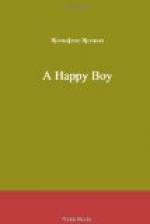A bush caught her dress; she turned to free it, and so she was standing when Oyvind saw her first. Her head was bare, her hair twisted up as girls usually wear it in every-day attire; she had on a thick plaid dress without sleeves, and nothing about the neck except a turned-down linen collar. She had just stolen away from work in the fields, and had not ventured on any change of dress. Now she looked up askance and smiled; her white teeth shone, her eyes sparkled beneath the half-closed lids. Thus she stood for a moment working with her fingers, and then she came forward, growing rosier and rosier with each step. He advanced to meet her, and took her hand between both of his. Her eyes were fixed on the ground, and so they stood.
“Thank you for all your letters,” was the first thing he said; and when she looked up a little and laughed, he felt that she was the most roguish troll he could meet in a wood; but he was captured, and she, too, was evidently caught.
“How tall you have grown,” said she, meaning something quite different.
She looked at him more and more, laughed more and more, and he laughed, too; but they said nothing. The dog had seated himself on the slope, and was surveying the gard. Thore observed the dog’s head from the water, but could not for his life understand what it could be that was showing itself on the cliff above.
But the two had now let go of each other’s hands and were beginning to talk a little. And when Oyvind was once under way he burst into such a rapid stream of words that Marit had to laugh at him.
“Yes, you see, this is the way it is when I am happy—truly happy, you see; and as soon as it was settled between us two, it seemed as if there burst open a lock within me—wide open, you see.”
She laughed. Presently she said,—
“I know almost by heart all the letters you sent me.”
“And I yours! But you always wrote such short ones.”
“Because you always wanted them to be so long.”
“And when I desired that we should write more about something, then you changed the subject.”
“’I show to the best advantage when you see my tail,’[1] said the hulder.”
[Footnote 1: The hulder in the Norse folk-lore appears like a beautiful woman, and usually wears a blue petticoat and a white sword; but she unfortunately has a long tail, like a cow’s, which she anxiously strives to conceal when she is among people. She is fond of cattle, particularly brindled, of which she possesses a beautiful and thriving stock. They are without horns. She was once at a merry-making, where every one was desirous of dancing with the handsome, strange damsel; but in the midst of the mirth a young man, who had just begun a dance with her, happened to cast his eye on her tail. Immediately guessing whom he had gotten for a partner, he was not a little terrified; but, collecting himself, and unwilling to betray her, he merely said to her when the dance was over: “Fair maid, you will lose your garter.” She instantly vanished, but afterwards rewarded the silent and considerate youth with beautiful presents and a good breed of cattle. FAYE’S Traditions.—NOTE BY TRANSLATOR.]




